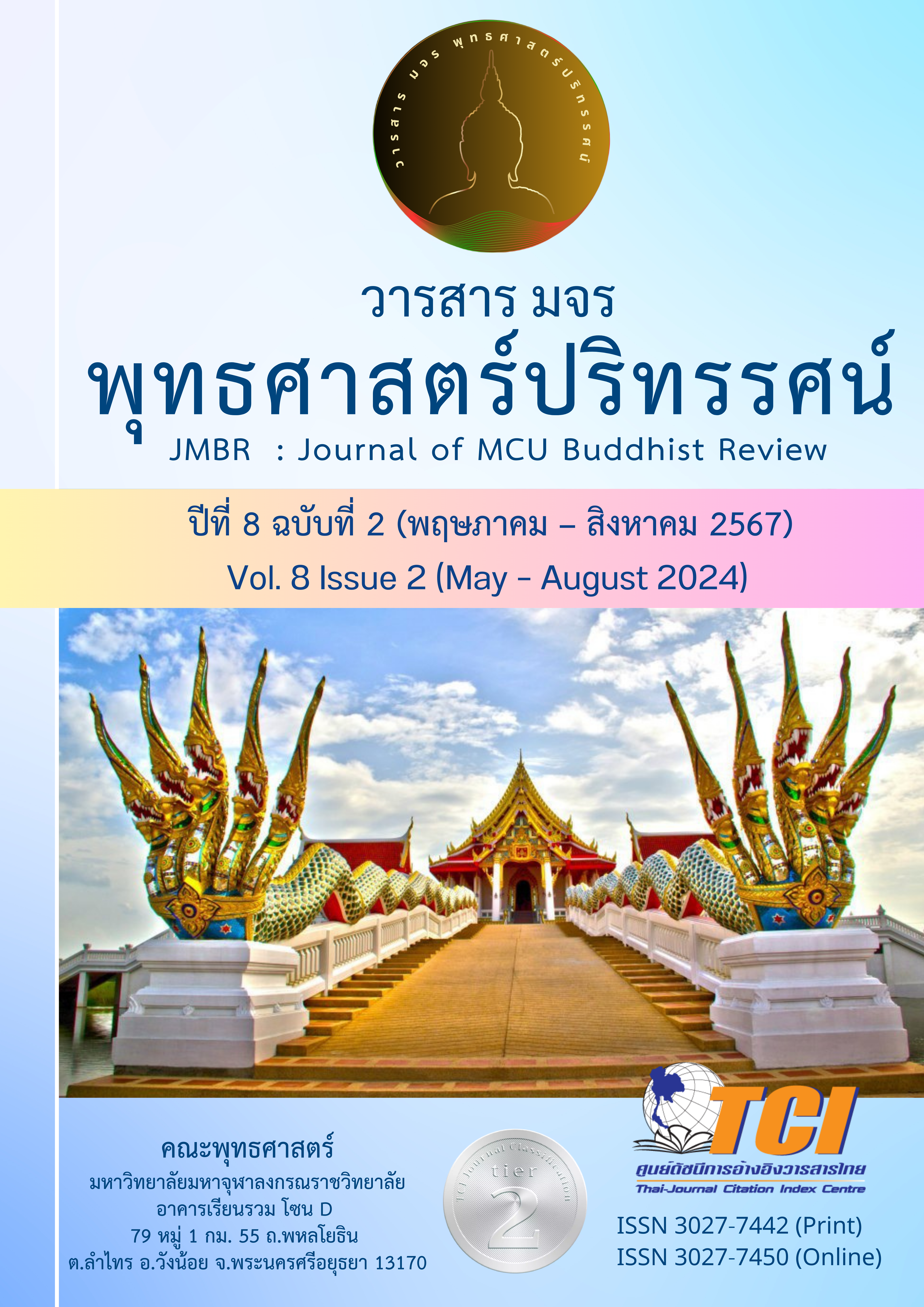การศึกษาวิเคราะห์บทบาทของท้าวมหาราชทั้ง 4 ในอาฏานาฏิยสูตร
Main Article Content
บทคัดย่อ
บทความวิจัยนี้มีวัตถุประสงค์ 1) เพื่อศึกษาโครงสร้างและเนื้อหา 2) เพื่อศึกษาวิเคราะห์บทบาทของท้าวมหาราชทั้ง 4 3) เพื่อศึกษาวิเคราะห์บทบาทของท้าวมหาราชทั้ง 4 ในอาฏานาฏิยสูตร วิเคราะห์โดยศึกษาข้อมูลจากคัมภีร์พระไตรปิฎกและเอกสารที่เกี่ยวข้อง
ผลการวิจัยพบว่า 1) อาฏานาฏิยสูตรเป็นพระสูตรว่าด้วยเรื่องของท้าวมหาราชทั้ง 4 พระสูตรนี้ เป็นพระสูตรขนาดยาวเป็นพระสูตรที่เกี่ยวข้องกับการนำเอาอาฏานาฏิยมนต์เข้าถวายพระพุทธเจ้า โดยท้าวมหาราชทั้ง 4 โดยในตัวพระสูตรหรือเนื้อหาในอาฏานาฏิยมนต์จะมีเนื้อหาอยู่ 5 ตอนคือ 1) เรื่องพระพุทธเจ้า 7 พระองค์ 2) เรื่องท้าวมหาราชในทิศทั้ง 4 3) เรื่องอุตตรกุรุทวีปของท้าวเวสวัณ 4) เรื่องผลที่เกิดและวิธีปฏิบัติในมนต์อาฏานาฏิยะ 5) พระผู้มีพระภาคทรงสรุปเรื่องนอกจากนั้น ก็เป็นเรื่องที่เกี่ยวข้องกับวิธีการในการใช้มนต์บทนี้ในการสาธยายเพื่อให้เกิดประโยชน์โดยสิ่งที่จะทำให้มนต์เกิดผลก็คือ 1) สถานที่สวด 2) ผู้สวดจะต้องมีศีล และ 3) ผู้สวดจะต้องแผ่เมตตาก่อนสวดทุกครั้ง 2) บทบาทของท้าวมหาราชทั้ง 4 ในอาฏานาฏิยสูตร พบว่า 1) ท้าวมหาราชทั้ง 4 มีกำเนิดมาจากการทำเหตุ 3 ประการคือ 1) บุญกิริยาวัตถุ 2) การถือพระรัตนตรัยเป็นสรณะ 3) การทำบุญแล้วตั้งจิตอธิษฐาน ส่วนบทบาทของท้าวมหาราชทั้ง 4 นั้นมีอยู่ทั้งหมด 3 ด้าน ได้แก่ 1) บทบาทในการคุ้มครองพระพุทธเจ้า 2) บทบาทที่มีต่อพุทธบริษัท 4 3) บทบาทในโลกสวรรค์ ผลจากการวิเคราะห์เรื่องของบทบทของท้าวมหาราชทั้ง 4 พบว่ามีบทบาทสำคัญอยู่ 3 ประการคือ 1) บทบาทด้านการอุปถัมภ์และคุ้มครองพระพุทธศาสนา 2) บทบาทด้านการตรวจดูโลกและ 3) บทบาทด้านการปกครองอมนุษย์ 3) ผลจากการวิเคราะห์บทบาทท้าวมหาราชทั้ง 4 ก่อให้เกิดคุณค่าในเรื่องต่าง ๆ ดังต่อไปนี้ 1) คุณค่าเรื่องของการเรียนรู้หลักธรรม อันได้แก่ 1.1) การเรียนรู้หลักคำสอนเรื่องกรรม 1.2) การเรียนรู้หลักคำสอนเรื่องบุญ 1.3) การเรียนรู้หลักคำสอนเรื่องเมตตา 2) คุณค่าเรื่องของการสวดมนต์ 3) คุณค่าด้านสังคม 4) คุณค่าด้านการศึกษา
Article Details

อนุญาตภายใต้เงื่อนไข Creative Commons Attribution-NonCommercial-NoDerivatives 4.0 International License.
- บทความที่ได้รับการตีพิมพ์เป็นลิขสิทธิ์ของวารสาร มจร พุทธศาสตร์ปริทรรศน์
- ข้อความใดๆ ที่ปรากฎในบทความที่ได้รับการตีพิมพ์ในวารสาร ถือเป็นความรับผิดชอบของผู้เขียนบทความ และข้อคิดเห็นนั้นไม่ถือว่าเป็นทัศนะและความรับผิดชอบของกองบรรณาธิการวารสาร มจร พุทธศาสตร์ปริทรรศน์
เอกสารอ้างอิง
ธนิต อยู่โพธิ์. (2525). อานิสงส์ศีล 5. พิมพ์ครั้งที่ 2. กรุงเทพฯ: ห้างหุ้นส่วนศิวพร จำกัด.
พญาลิไทย. (2528). ไตรภูมิกถาหรือไตรภูมิพระร่วง. กรุงเทพฯ: กรมศิลปากร.
พระธรรมปิฏก (ป.อ.ปยุตฺโต). (2553). พจนานุกรมพุทธศาสน์ฉบับประมวลศัพท์. กรุงเทพฯ: บริษัทสหธรรมิกจำกัด.
พระธรรมปิฏก (ป.อ.ปยุตฺโต). (2551). พจนานุกรมพุทธศาสน์ ฉบับประมวลศัพท์. พิมพ์ครั้งที่ 11. กรุงเทพฯ: บริษัท เอส. อาร์. พริ้นติ้งแมส โปรดักส์ จำกัด.
พระธรรมปิฏก (ป.อ.ปยุตฺโต). (2551). พจนานุกรมพุทธศาสตร์ ฉบับประมวลธรรม. พิมพ์ครั้งที่ 16. กรุงเทพฯ: บริษัท เอส.อาร์.พริ้นติ้งแมส โปรดักส์ จำกัด.
มหาจุฬาลงกรณราชวิทยาลัย. (2539). พระไตรปิฎกภาษาไทย ฉบับมหาจุฬาลงกรณราชวิทยาลัย. กรุงเทพฯ: มหาจุฬาลงกรณราชวิทยาลัย.


